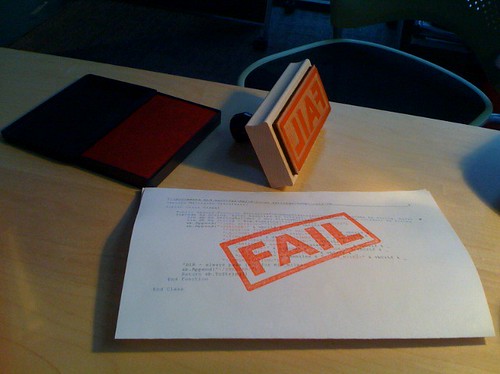
Perhaps as a counter-balance to my previous blog post, I’ve been reflecting on an article by David Wong that appeared this month in Cracked.Com: “Six Harsh Truths That Will Make You A Better Person.”
While I don’t agree with all of Wong’s assertions, there are a few that I think we should take to heart in the nonprofit sector. I present them here as bullet points:
- “The World Only Cares About What It Can Get from You”
Wong points out two corollaries to this: “…society is full of people who need things….” and “(e)ither you will go about the task of seeing to those needs by learning a unique set of skills, or the world will reject you, no matter how kind, giving and polite you are.”
He’s right, or at least he should be.
(We all know of high-profile nonprofit professionals whose main achievement is making people feel warm inside. They don’t contribute to any lasting and positive change, but they get plenty of photo opportunities. If this were an entirely fair universe, the world would be rejecting them, and instead it applauds them. However, they are the exceptions.)
Most of us are plebs in the nonprofit sector, and we are obliged to solve problems in order to justify our continued employment. That’s the way it should be. At the end of the day, if our organization’s mission is to save whales, then we should be judged on how our efforts add up to success in saving whales. That might involve sticking to methods that have stood the test of time, or to finding ways to save more whales with fewer resources, or to finding ways to ensure that once we save them they stay healthy for the long run. We have to keep our eye on results, and not give free passes to people who are merely impassioned without being effective.
By this I don’t mean that personalities and processes should be completely discounted. It’s important to be considerate, ethical, and fair. It’s also important to value the processes enough to learn from both failures and successes. But having a pure heart is not enough, either as a process or an outcome, when your self-proclaimed mission is to save the whales.
- “What You Produce Does Not Have to Make Money, But It Does Have to Benefit People”
‘Nuff said, right? This the nonprofit sector, right? It’s not just that people ask “
what’s in it for me?” when they donate, it’s that we’re living in an
WIIFM universe. If what’s in it for us, as nonprofit professionals, is the dubious glamor of
altruism, I suppose that’s alright, but we still have an obligation to make our work more than a vanity project. Again, if it were a fair world, then effective projects would get more love than vanity projects. But even though it’s unfair, there’s still a principle involved that obligates us to be as effective as possible in benefiting the world, even when that’s less glamorous.
- “Everything Inside You Will Fight Improvement”
Thank you, Mr. Wong. This is true indeed – not just for individuals, but for nonprofit organizations. This one of the most compelling reasons why outcomes management is such an uphill battle in our sector. It’s not just that we don’t like being judged by our results; it’s that we don’t like having to change.
I’m not using the first person plural (e.g., “we”) here in a abstract, vague, editorial way. I’m using it, because I’m talking about flaws in which I fully partake. When Wong says, “(t)he human mind is a miracle, and you will never see it spring more beautifully into action than when it is fighting against evidence that it needs to change,” he’s certainly speaking to my condition.
Here is his list of the powerful defense mechanisms of which I am (and perhaps you are) capable of fielding when we are challenged or criticized:
“Intentionally Interpreting Any Criticism as an Insult”
“Focusing on the Messenger to Avoid Hearing the Message”
“Focusing on the Tone to Avoid Hearing the Content”
“Revising (My) Own History”
“Pretending That Any Self-Improvement Would Somehow Be Selling Out (My) True Self”
Of course, my personal favorite is the last mentioned. When I start wallowing in it, I do my best to remember that there are more important (and perhaps more valid) ethical principles at stake than expressing what I take to be my essential nature.
In fact, it’s our obligation to submit to public scrutiny and criticism when we work in the nonprofit sector. (At least, it is in the U.S.; I can’t say much about other countries.) As George McCully points out in his book
Philanthropy Reconsidered, we are engaged in private initiatives for the public good, and the public has a right to evidence that we deserve the trust that is vested in us. They deserve to know that we are striving to serve them with both processes and results that are valid, and that we are quickly learning from processes and results that do not yield strong positive benefits over the long run.





